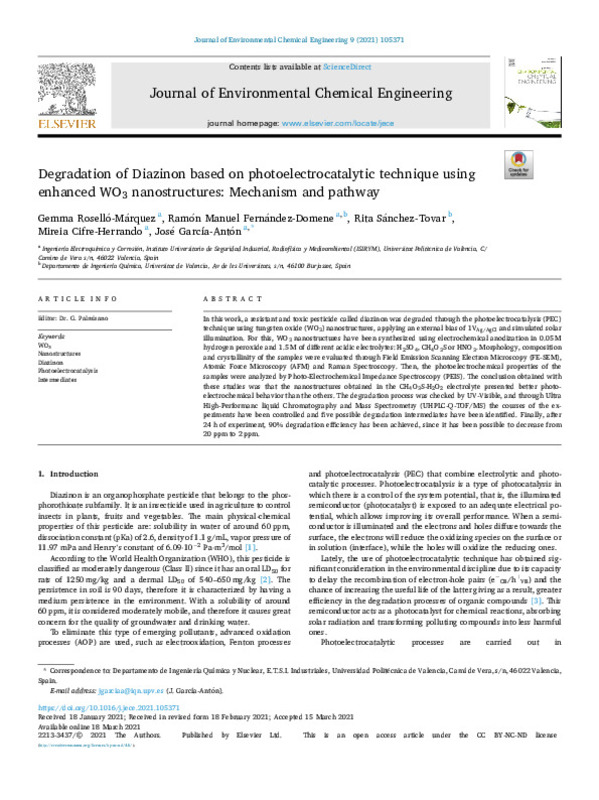JavaScript is disabled for your browser. Some features of this site may not work without it.
Buscar en RiuNet
Listar
Mi cuenta
Estadísticas
Ayuda RiuNet
Admin. UPV
Degradation of Diazinon based on photoelectrocatalytic technique using enhanced WO3 nanostructures: Mechanism and pathway
Mostrar el registro sencillo del ítem
Ficheros en el ítem
| dc.contributor.author | Roselló-Márquez, Gemma
|
es_ES |
| dc.contributor.author | Fernández-Domene, Ramón Manuel
|
es_ES |
| dc.contributor.author | Sánchez-Tovar, Rita
|
es_ES |
| dc.contributor.author | Cifre-Herrando, Mireia
|
es_ES |
| dc.contributor.author | Garcia-Anton, Jose
|
es_ES |
| dc.date.accessioned | 2022-10-18T18:03:18Z | |
| dc.date.available | 2022-10-18T18:03:18Z | |
| dc.date.issued | 2021-08 | es_ES |
| dc.identifier.uri | http://hdl.handle.net/10251/188186 | |
| dc.description.abstract | [EN] In this work, a resistant and toxic pesticide called diazinon was degraded through the photoelectrocatalysis (PEC) technique using tungsten oxide (WO3) nanostructures, applying an external bias of 1VAg/AgCl and simulated solar illumination. For this, WO3 nanostructures have been synthesized using electrochemical anodization in 0.05 M hydrogen peroxide and 1.5 M of different acidic electrolytes: H2SO4, CH4O3S or HNO3. Morphology, composition and crystallinity of the samples were evaluated through Field Emission Scanning Electron Microscopy (FE-SEM), Atomic Force Microscopy (AFM) and Raman Spectroscopy. Then, the photoelectrochemical properties of the samples were analyzed by Photo-Electrochemical Impedance Spectroscopy (PEIS). The conclusion obtained with these studies was that the nanostructures obtained in the CH4O3S-H2O2 electrolyte presented better photoelectrochemical behavior than the others. The degradation process was checked by UV-Visible, and through Ultra High-Performanc liquid Chromatography and Mass Spectrometry (UHPLC-Q-TOF/MS) the courses of the experiments have been controlled and five possible degradation intermediates have been identified. Finally, after 24 h of experiment, 90% degradation efficiency has been achieved, since it has been possible to decrease from 20 ppm to 2 ppm. | es_ES |
| dc.description.sponsorship | Authors would like to show their gratitude for the financial support to the Ministerio de Ciencia e Innovacion (Project code: PID2019105844RB-I00) in the acquisition of Laser Raman Microscope (UPOV083E-012) and for the co-finance by the European Social Fund. Authors would also want to express thanks the Ministerio de Ciencia, Innovacion y Universidades (Project Code: CTQ2017-90659-REDT) and the Generalitat Valenciana for its support in the Atomic Force Microscope and UHPLC-Q-TOF/MS purchase (IDIFEDER/2018/044). Ramon M. Fernandez Domene also express gratitude to the Universitat Politecnica de Valencia (UPV) for the post-doctoral granting (PAID-10-17) and Gemma Rosello Marquez also thanks the Generalitat Valenciana for the pre-doctoral granting (ACIF/2018/159). | es_ES |
| dc.language | Inglés | es_ES |
| dc.publisher | Elsevier | es_ES |
| dc.relation.ispartof | Journal of Environmental Chemical Engineering | es_ES |
| dc.rights | Reconocimiento - No comercial - Sin obra derivada (by-nc-nd) | es_ES |
| dc.subject | WO3 | es_ES |
| dc.subject | Nanostructures | es_ES |
| dc.subject | Diazinon | es_ES |
| dc.subject | Photoelectrocatalysis | es_ES |
| dc.subject | Intermediates | es_ES |
| dc.subject.classification | INGENIERIA QUIMICA | es_ES |
| dc.title | Degradation of Diazinon based on photoelectrocatalytic technique using enhanced WO3 nanostructures: Mechanism and pathway | es_ES |
| dc.type | Artículo | es_ES |
| dc.identifier.doi | 10.1016/j.jece.2021.105371 | es_ES |
| dc.relation.projectID | info:eu-repo/grantAgreement/AEI/Plan Estatal de Investigación Científica y Técnica y de Innovación 2017-2020/PID2019-105844RB-I00/ES/NANOTECNOLOGIA ELECTROQUIMICA PARA APLICACIONES CATALITICAS EN LOS CAMPOS MEDIOAMBIENTAL Y ALMACENAJE DE ENERGIA/ | es_ES |
| dc.relation.projectID | info:eu-repo/grantAgreement/MINECO//UPOV08-3E-012/ | es_ES |
| dc.relation.projectID | info:eu-repo/grantAgreement/UPV//PAID-10-17/ | es_ES |
| dc.relation.projectID | info:eu-repo/grantAgreement/GVA//IDIFEDER%2F2018%2F044//MODIFICACIÓN DE FOTOCATALIZADORES DE ÓXIDOS METÁLICOS NANOESTRUCTURADOS PARA LA ELIMINACIÓN DE FÁRMACOS Y PRODUCCIÓN ENERGÉTICA/ | es_ES |
| dc.relation.projectID | info:eu-repo/grantAgreement/AEI//CTQ2017-90659-REDT//APLICACIONES MEDIOAMBIENTALES Y ENERGETICAS DE LA TECNOLOGIA ELECTROQUIMICA/ | es_ES |
| dc.relation.projectID | info:eu-repo/grantAgreement/GVA//ACIF%2F2018%2F159//AYUDA PREDOCTORAL GVA-ROSELLO MARQUEZ/ | es_ES |
| dc.rights.accessRights | Abierto | es_ES |
| dc.contributor.affiliation | Universitat Politècnica de València. Departamento de Ingeniería Química y Nuclear - Departament d'Enginyeria Química i Nuclear | es_ES |
| dc.description.bibliographicCitation | Roselló-Márquez, G.; Fernández-Domene, RM.; Sánchez-Tovar, R.; Cifre-Herrando, M.; Garcia-Anton, J. (2021). Degradation of Diazinon based on photoelectrocatalytic technique using enhanced WO3 nanostructures: Mechanism and pathway. Journal of Environmental Chemical Engineering. 9(4):1-12. https://doi.org/10.1016/j.jece.2021.105371 | es_ES |
| dc.description.accrualMethod | S | es_ES |
| dc.relation.publisherversion | https://doi.org/10.1016/j.jece.2021.105371 | es_ES |
| dc.description.upvformatpinicio | 1 | es_ES |
| dc.description.upvformatpfin | 12 | es_ES |
| dc.type.version | info:eu-repo/semantics/publishedVersion | es_ES |
| dc.description.volume | 9 | es_ES |
| dc.description.issue | 4 | es_ES |
| dc.identifier.eissn | 2213-3437 | es_ES |
| dc.relation.pasarela | S\451317 | es_ES |
| dc.contributor.funder | European Social Fund | es_ES |
| dc.contributor.funder | Generalitat Valenciana | es_ES |
| dc.contributor.funder | Agencia Estatal de Investigación | es_ES |
| dc.contributor.funder | Universitat Politècnica de València | es_ES |
| dc.contributor.funder | Ministerio de Economía y Competitividad | es_ES |








